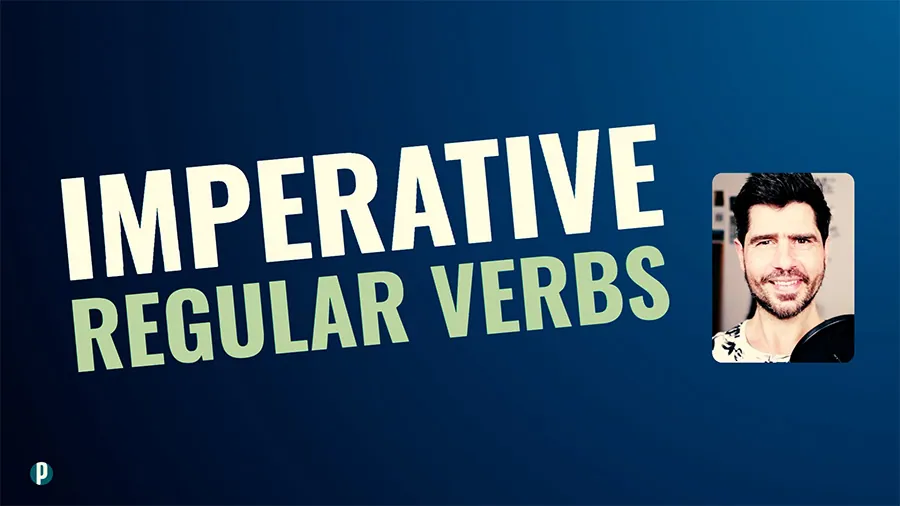الأمر الحتمي باللغة البرتغالية
Like other Romance languages, Portuguese has an abundance of verb forms. Adding to the pile is the Imperative mood. We use the Imperative to give instructions and commands, urge someone to do something, and give spatial directions.
Now, the Imperative form in Portuguese will change depending on whether the tone is casual or formal, whether you are affirming or negating something, or whether you are talking to a single person or a group of people.
Here’s an example with the verb Falar (Speak):
| حتمية 1 | singular, informal | Fala mais baixo. (Lower your voice) |
| حتمية 2 | singular, informal (negation) | Não fales mais baixo. (Don’t lower your voice) |
| حتمية 3 | singular, formal | Fale mais baixo. (Lower your voice) |
| حتمية 4 | جمع | Falem mais baixo. (Lower your voice) |
Then, the challenge is knowing when to use the Imperative as much as recalling the right form that matches the context. Luckily, there are a couple of helpful tricks. Read on.
الإستراتيجية 1 - التغيير والتبديل في نهايات ضمير المتكلم في زمن المضارع
هذه الإستراتيجية بسيطة ومباشرة وتحظى بشعبية كبيرة بين المبتدئين.
تبدأ بضمير المتكلم في المضارع البسيط للفعل المعني، ومن هناك، تقوم بتعديل نهايته للعثور على صيغة الأمر التي تبحث عنها. كل ما تحتاجه هو تعلم بعض أنماط التغيير والتبديل كما هو موضح أدناه.
ولكن هناك تحذير! إنه يعمل فقط للأفعال العادية.
من المؤكد أن معظم الأفعال منتظمة، وبالتالي فإن هذه الإستراتيجية لا تزال قابلة للتطبيق على نطاق واسع ومفيدة. ومع ذلك، كما تعلم، فإن بعض الأفعال الأكثر استخدامًا تكون غير منتظمة.
ومع ذلك، دعونا نتعلم هذه التعديلات.
تعرف على المزيد حول الاقتران المنتظم:
الأفعال المنتظمة البرتغالية في المضارع
الأفعال المنتظمة البرتغالية في زمن الماضي
مفرد وغير رسمي (tu)
في السياقات غير الرسمية، يختلف شكل الأمر اعتمادًا على ما إذا كان جزءًا من جملة إيجابية أو سلبية.
للعثور على المتغيرات الإيجابية والسلبية، ولكل مجموعة تصريفية، نقوم بتعديل نهايات ضمير المتكلم في المضارع وفقًا للأنماط التالية:
| FIRST-PERSON Present tense | IMPERATIVE 1 affirmation | IMPERATIVE 2 negation | |
| -ar | andar | ando | anda! | não andes! |
| -er | beber | bebo | bebe! | não bebas! |
| -ir | partir | parto | parte! | não partas! |
المفرد والرسمي (você)
في السياقات الرسمية، هناك صيغة أمر واحدة فقط (بغض النظر عما إذا كانت الجملة إيجابية أو غير ذلك).
للعثور عليه، ولكل مجموعة تصريف، نقوم بتعديل نهايات ضمير المتكلم في المضارع وفقًا للأنماط التالية:
| FIRST-PERSON Present tense | IMPERATIVE 3 | |
| -ar | andar | ando | (não) ande! |
| -er | beber | bebo | (não) bebe! |
| -ir | partir | parto | (não) parta! |
جمع (vocês)
أخيرًا، عندما نتحدث إلى مجموعة من الأشخاص، نقوم بتعديل نهايات زمن المضارع بضمير المتكلم وفقًا للأنماط التالية:
| FIRST-PERSON Present tense | IMPERATIVE 4 | |
| -ar | andar | ando | (não) andem! |
| -er | beber | bebo | (não) bebam! |
| -ir | partir | parto | (não) partam! |
مرة أخرى، كل هذه التعديلات الإملائية لن تعمل مع الأفعال الشاذة. للتعامل مع هذه الأمور، سيتعين عليك اعتماد الإستراتيجية الثانية أدناه أو حفظها عن ظهر قلب مع مرور الوقت.
الأفعال الشاذة

Olá! I'm Pedro and I'm your Portuguese teacher.
Learning European Portuguese? Portuguesepedia is an all-in-one platform providing a wealth of learning resources, from bite-sized video lessons to immersive idiomatic dips. Perfect your pronunciation and listening comprehension with listening drills and solidify your grammar with in-depth articles. Start your Portuguese journey today!
Share this article
Get my guide "Key Strategies to Learn Portuguese" for FREE.

